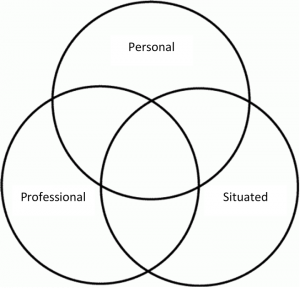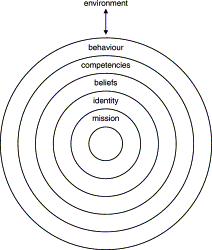
June 22, 2020, by Rupert Knight
Teachers’ changing professional identity
In this blog Esther Fulton looks at the processes involved in developing your own teacher identity, particularly in the current times.
What does it mean to be a teacher during Covid-19?
My own identity as a teacher educator has been dramatically altered during the last few months. My comfort zone has always been when I am able to speak to people face to face and educate my students through collaboration and discussion. Working through computer screens did not fit comfortably with me. However, along with the rest of the country, I have had to adapt and change and reflect on the identity I am now developing.
On all of our PGCE courses at the University of Nottingham we constantly refer to teacher identity and sense of self. All of our students enter their training with preconceptions of what type of teacher they want to become and the professional identity they want to embrace. Their ten month learning journey often leads to them questioning these preconceptions and this questioning will continue as they move between different school contexts and management teams. In the current Covid-19 climate this identity will be fluctuating for all teaching professionals.
In order to understand their own teacher identity all PGCE students need to be able to reflect on their own experiences and make sense of these and then build up their own strategies for increasing their resilience. Here at the University of Nottingham we link this to the Phases and Strands that underpins all our PGCE courses. One strand in particular is how to develop as a ‘thinking teacher’. We encourage the use of critical reflection throughout the training and support our students to make sense of their experiences either for themselves or to others. They are encouraged to take time to reconstruct and reorganise their thoughts as it is necessary for their own personal and intellectual growth and the growth of others. Attitudes towards learning will change over time and so we need to‘ensure that all student teachers have the space, time and encouragement to articulate, and critically examine, their differing conceptions of the process of learning to teach’ (Hagger et al,2008)

Nearly 100 years ago Dewey identified different types of thought, one of these being reflection. He stressed that education needed to prepare students for a changing future and that priority should be given to developing effective ways of adapting and ‘learning how to learn’. Since then, many scholars have interpreted Dewey’s work in different ways but his set of attitudes rings true with the teaching of our students. We want our beginning teachers to enter into their training and the profession with ’open-mindedness’, ‘wholeheartedness’ and ‘responsibility’. This gives them a chance to be curious about their pupils, their teaching and learning, to be able to stand back and observe; to be able to acknowledge their own limitations and be open to new ways of viewing things and accepting a change in their own beliefs, and to be aware of the consequences of their actions. By becoming a reflective teacher, our students have the opportunity to raise questions rather than finding all the answers and most importantly, acknowledging that emotions are involved in this. Day and Kington (2008) have developed a plethora of research around the emotional contexts of teaching and the different dimensions of teacher identity development. They highlight the three main influences:
Professional– what constitutes a good teacher, social trends, national policy, roles and responsibilities etc.
Situated– affected by the type of school, pupils, support, working context.
Personal– life outside of school, identity of being a father, daughter, partner etc.

At some point one of these three dimensions may become more dominant and so will require additional time and attention from the teacher, which then affects their well-being, agency and sense of vulnerability (Day and Kington, 2008). Being more reflective encourages a teacher to be aware of which aspect is being challenged and how they can modify or discard it and also focus on the aspect that needs to be maintained and strengthened. Teacher’s identities are therefore influenced by how they feel about themselves and how they feel about their pupils.
Korthagen and Vasalos (2005) discuss ‘levels of reflection’ and how these can enhance professional growth.

We ask our students to look at the different layers and decide which ones are most relevant to them at a given time. Is it the inner layers (beliefs, identity) or mostly the outer layers (environment, behaviour and competencies)? Then linked to this is ‘what is the ideal situation?’ and ‘what are the limiting factors or obstacles preventing the achievement of that ideal?’ If our students can reflect on what is affecting them, then they are hopefully able to adapt and change to certain situations that they are in which will lead to adapting their professional identities as well.
Forming your own teacher identity is dependent on multiple contexts (social, cultural, political and historical) and is reliant on the relationship with others and therefore involves emotions. These emotions are shaped by the conditions of work and manifest in interactions with pupils, parents and other school staff. The key message is that this identity will continue to shift and change over time and is not a fixed attribute- it is an ongoing process. Over this year our PGCE students have been developing their own teacher identities through school tasks, engaging with literature and research and observations and teaching within placements.
By March they had more of a clear idea of the type of teacher they wanted to be and what their own targets were to achieve this before they entered into their NQT year. This then became complicated with the closure of schools and placements being withdrawn. Our students have since been engaging in our online learning programme and have been able to spend time deepening their own subject knowledge and professional development so that they feel confident and prepared to go into their new roles in September.
Some of our beginning teachers may be feeling more vulnerable as the rules and norms have changed and they have had to adapt to a different way of being a teacher. However, with the background they have already had with being reflective teachers they will be able to adapt to the specific context they find themselves in and can alter their actions in order to fulfil a role needed at the present time.
As they return to the classroom context in September, this generation of beginning teachers may feel unstable and anxious and will face different challenges to previous NQT’s. They need to be able to develop their own teacher identity within that school environment and think about the core levels of reflection to help them. The situation they are in may not be ‘ideal’ but they will hopefully draw on their teacher resilience and continue to build positive relationships with their pupils, staff and school community. They may need to ask themselves the following questions suggested by Korthagen et al:
• What do I encounter?
• What do I do?
• What am I competent at?
• What do I believe?
• What motivates me?

I am sure our beginning teachers will draw on their past experience this year and be able to synthesise meaning from their current experience. By interacting with others and taking time to reflect on their situation I hope that their professional identity becomes clear and well developed and they have the confidence to adjust to their new situation appropriately. They will hopefully see that they are in a somewhat better position when they enter into the profession in September as they are entering a new and different way of teaching that some more experienced teachers may find difficult to adapt to. I know that I have learnt much over the last few months about responding to the context you are in and accepting what you cannot change. By entering into their new roles with ‘open-mindedness’ and ‘wholeheartedness’ I am sure they will continue on their reflective journey to become amazing teachers.
References:
Day, C. and Kington, A., 2008. Identity, well‐being and effectiveness: The emotional contexts of teaching. Pedagogy, culture & society, 16(1), pp.7-23.
Hagger, H., Burn, K., Mutton, T. and Brindley, S., 2008. Practice makes perfect? Learning to learn as a teacher. Oxford Review of Education, 34(2), pp.159-178.
Korthagen, F. and Vasalos, A., 2005. Levels in reflection: Core reflection as a means to enhance professional growth. Teachers and teaching, 11(1), pp.47-71.

Interesting blog whether a student teacher, an RQT like me or an experienced teacher. Reflection, open mindedness and adaptation has been key to the last few months.